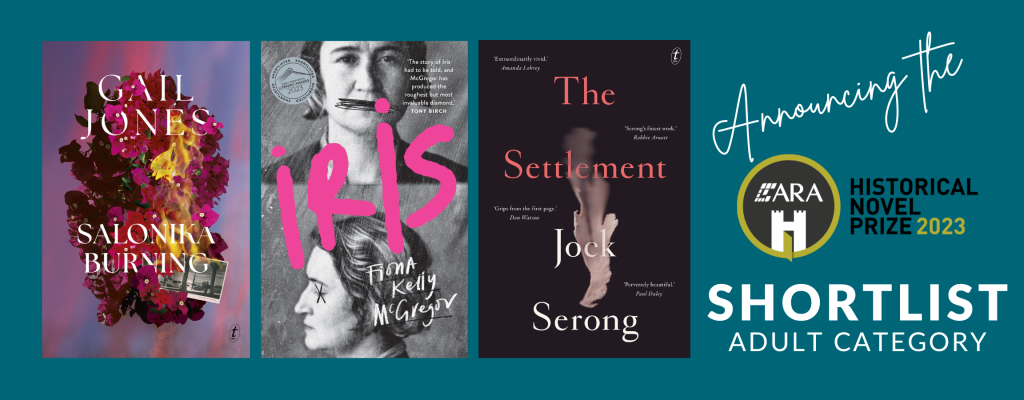
Historical Novel Society Australasia (HNSA), in partnership with Australia’s leading essential building and infrastructure services provider ARA Group, is excited to announce the Shortlist for the 2023 ARA Historical Novel Prize – Adult Category:
- Salonika Burning – Gail Jones (Text Publishing)
- Iris – Fiona Kelly McGregor (Pan Macmillan Australia)
- The Settlement – Jock Serong (Text Publishing)
The Winners of the ARA Historical Novel Prize will be announced on Thursday 19 October 2023.
The Judging Panel
The 2023 judging panel for the Adult category included Dr Robert Gott (Chair), Dr Renée Otmar and Lucy Treloar.
According to the judging panel, “This year’s shortlist represents a tight finish, with three exceptional works that offer fresh perspectives on historical events and figures. They invite us to question what we know, or think we know, about our history and those who inhabit it.”
“The novels chose themselves as much as we have chosen them: powerful, compelling stories from history that reflect the cultural narratives and conversations of contemporary Australia.”
“In one novel, and a scenario so intimately familiar yet simultaneously alien to Australians in the 20th century, we follow four significant historical figures who offer themselves as medical volunteers responding to an environmental and humanitarian crisis sparked both by human error and wilfulness. Another confronts the painful, yet fundamental, questions inherent in seeking an understanding of truth-telling and ownership for the wrongdoings of colonisation. We find its threads of reclamation deeply woven within a third novel, which employs the vernacular of Sydney’s criminal underbelly to provide a richly detailed account of life in the Depression era, particularly for women.”
“If there is a theme uniting these three novels, it is perhaps a desire for freedom – from the constraints of unjust laws and social convention as much as from our self-inflicted boundaries.”
Due to an actual or perceived conflict of interest Dr Robert Gott recused himself from discussions relating to the inclusion of a particular book on the longlist. He withdrew from determining the shortlist and winner.
Salonika Burning by Gail Jones
(Text Publishing)
About Gail Jones
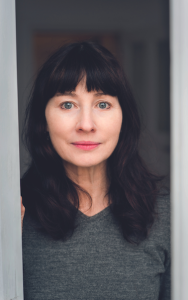
in Sydney.
About Salonika Burning
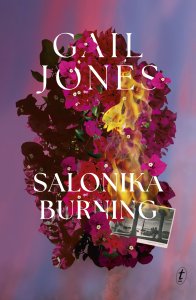
Amid the destruction are those who have come to the frontlines to heal: surgeons, ambulance drivers, nurses, orderlies and other volunteers. Four of them – Stella, Olive, Grace and Stanley – are at the centre of Gail Jones’s extraordinary new novel, which takes its inspiration from the wartime experiences of Australians Miles Franklin and Olive King, and British painters Grace Pailthorpe and Stanley Spencer. In Jones’s imagination these four lives intertwine and change, each compelled by the desire to create something meaningful in the ruins of a broken world.
Immersive and gripping, Salonika Burning illuminates not only the devastation of war but also the vast social upheaval of the times. It shows Gail Jones to be at the height of her powers.
A Quote from Gail Jones
“Imagining history, whether intimate or broad, is always a crucial task for writers. This award recognises the gravity of writerly engagement with difficult historical subjects. I’m delighted to be short-listed.”
A Quote from the Judging Panel
“In Salonika Burning, Gail Jones has created a compelling narrative, one deeply familiar in the Australian cultural vernacular and the nation’s interior landscape. The novel is set in the second great Ottoman city of Salonika, in which operations for allied forces had converged and where, on 18 August 1917, a spark from a homemade stove ignited a fire that blazed for 32 hours, destroying two-thirds of the city.”
“Here is a novel not of the Great War but rather intriguingly ‘war adjacent’. Infused with qualities both recognisable and fresh in historical fiction, the split narrative is loosely based on the experiences of four real-life figures who volunteered for medical service in response to the Great Fire of Salonika. While the observations of these protagonists might be viewed as representing but “a pleat in the ruffle of time”, each brings a unique perspective that bears witness to the horror and destruction: the burning city a microcosm of the war to end all wars.”
“Stella, Olive, Grace and Stanley strive independently to find meaning and their own place in the world. But there is a haunting frailty in their responses, even as they reach for fleeting moments of joy and beauty, through art, romance, love and intimacy. The prose is potent and poetic, offering a deep and stunning critique of the horrors and torments of war.”
Iris by Fiona Kelly McGregor
(Pan Macmillan Australia)
About Fiona Kelly McGregor

About Iris
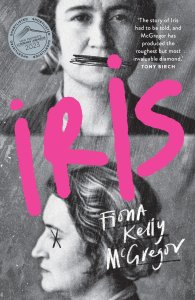
A thief, a fighter, a wife, a lover.
A scammer, a schemer, a friend.
A musician, a worker, a big-hearted fool.
A woman who has prevailed against the toughest gangsters of the day, defying police time and again, yet is now trapped in a prison cell.
Guilty or innocent?
Rollicking through the underbelly of 1930s sly-grog Sydney, Iris is a dazzling literary achievement from one of Australia’s finest writers. Based on actual events and set in an era of cataclysmic change, here is a fierce, fascinating tale of a woman who couldn’t be held back.
A Quote from Fiona Kelly McGregor
“It’s such an honour to be shortlisted for this award. History is so important. We don’t know who we are until we know what we’ve come from. Australia’s queer history has barely been represented in fiction; it has always been there, hidden, forbidden, yet intertwined with everybody’s history. It’s exciting to be alive at a time when we can finally exhume these relevant, urgent stories.”
A Quote from the Judging Panel
“In Iris, Fiona Kelly McGregor brings to vivid and complex life one of the most notorious figures of 1930s sly-grog Sydney, the petty criminal Iris Webber. Reputedly “the most violent woman in Sydney”, the Webber who McGregor reclaims and reimagines from the gaps in the historical record surfaces as a resourceful woman blazing with life. A real person emerges from the near-mythical tabloid portraits of her as a gun-slinging lesbian gangster. It’s a testament to McGregor’s skill throughout that Iris remains an actor, not a victim, and that in this world of poverty and crime, bawdy joyous tenderness survives.”
“The world-building is exceptional, textured, replete. In McGregor’s hands, Iris is a brilliant observer and chronicler of the interactions, sounds and rollicking vernacular of her world. Language expresses politics, and class, tribal and cultural affiliations, including queer culture. The novel is a remarkable act of documentation – reclamation of a time, place and its people. In it, McGregor gives voice to the forgotten, subverting the history told by people in power, and reminding us to remember people on the margins.”
“Like the best of historical fiction, Iris reaches into the present too. It asks, What happens to a person without education, family support and social welfare? As Australia grapples with a cost-of-living crisis, increasing housing precarity, and violence against marginalised groups, Iris and its rich cast of characters are stark and timely reminders to us all.”
“Picaresque, exhilarating and revelatory, Iris is a stunning achievement.”
The Settlement by Jock Serong
(Text Publishing)
About Jock Serong

About The Settlement
On the windswept point of an island at the edge of Van Diemen’s Land, the Commandant huddles with a small force of white men and women. He has gathered together, under varying degrees of coercion and duress, the last of the Tasmanians, or so he believes. His purpose is to save them—from a number of things, but most pressingly from the murderous intent of the pastoral settlers on their country.
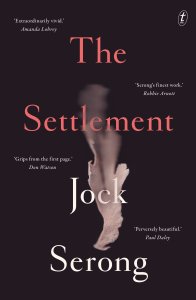
In The Settlement, Jock Serong reimagines in urgent, compelling prose the ill-fated exploits of George Augustus Robinson at the settlement of Wybalenna—a venture whose blinkered, self-interested cruelty might stand for the colonial enterprise itself.
A Quote from Jock Serong
“I’m so thrilled and honoured that The Settlement is among the shortlist for this year’s ARA Historical Novel Prize, especially because it means the story of Tasmania’s palawa and pakana peoples might reach new readers. A great deal of other historical writing about Tasmania is taking place now, bringing forth important new perspectives, and I’m grateful to have contributed to the discussion.”
A Quote from the Judging Panel
“This work is the final, and perhaps the finest, in Jock Serong’s trilogy on the invasion and settlement of the islands of Bass Strait in the early 19th century.”
“By itself, the narrative is powerful, gripping, haunting.”
“Read in the context of 21st-century Australia, it offers a commentary for now and for all times. As the nation edges toward a referendum to decide on the question of granting Indigenous peoples a voice in our Constitution, the novel offers an uncomfortable reminder of why that very question is being asked – indeed, needs to be asked. And fundamental to a reading of The Settlement is that other question: Who can, and should, write history? Serong’s answer bristles and blazes.”
“Importantly, The Settlement does not usurp the voices of First Nations peoples. Nor does it flinch from the violence, the treachery and, inevitably, the guilt accompanying the British as they seek to “civilise” landscapes, peoples, even Nature itself. Yet the invaders are not painted as all evil. Sensitively, unflinchingly, Serong restores to them their flawed humanity, perhaps inspired by the book’s epigraph:
“… Now all we understand is that we don’t understand. But we come in humility, and in guilt, knowing that in some way we are all murderers, we are all cannibals, and the dead have been our victims.” (Randolph Stow)
“The Settlement is testament to Serong’s oeuvre: exceptional and detailed research, meaningful consultation with First Nations peoples, fierce and incisive characterisations, and prose that sears to the very soul.”
ABOUT ARA GROUP

ARA Group provides a comprehensive range of building services and products to major customers throughout Australia and New Zealand and – through its workplace giving program, The ARA Endowment Fund – plays a proud and positive role in the community.
The ARA Endowment Fund currently donates 100 per cent of the interest earned annually to The Go Foundation, The Indigenous Literacy Foundation and The David Lynch Foundation.
ARA Group has also sponsored the Historical Novel Society Australasia’s biennial conferences since 2017, is Principal Partner of Sydney Writers’ Festival, the Melbourne Writers Festival, the Monkey Baa Theatre, the National Institute of Dramatic Art, Crown Sponsor of the Taronga Zoo and Significant Partner of the Story Factory.





